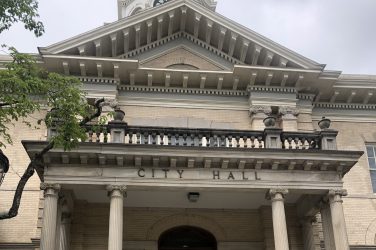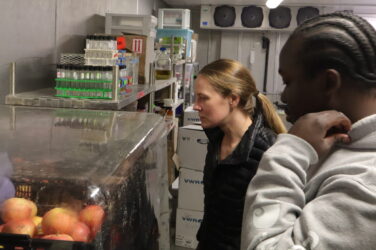This is one of several Solutions Journalism stories published through a Grady capstone course that reported on housing issues during the fall of 2018.

A 2009 study revealed that 23.5 million people in the U.S. live in a food desert. The West Broad Farmer’s Market Garden is working to combat against that in Athens, Georgia. The garden supports the West Broad neighborhood and was created in response to lack of affordable, locally grown produce.
Food deserts, as defined by the American Nutrition Association, are “parts of the country vapid of fresh fruit, vegetables, and other healthful whole foods, usually found in impoverished areas.”
The garden opened in 2012 with the aim of both providing sustainable food and educating the community on farming and nutrition. Athens Land Trust, a non-profit organization, manages the garden. It hosts a farmers market every Saturday from April to December.
“We encourage [the neighborhood] to come in and volunteer and take some produce home,” said Cameron Teeter, manager of the garden.
The West Broad garden is just one of many gardens across the U.S. that are working to combat food deserts. North Dakota State University’s Department of Public Health released a presentation proposing a solution for food deserts in their community, which included opening local gardens and hosting farmer’s markets.
Teeter explained the primary goal of the garden as well as some challenges it faces with pricing:
The half-acre garden has continued to grow in the past six years, but faces some challenges with the extreme temperatures in the summer and the storms in the fall.
“We were trying to plant our fall stuff, but it was still 90 degrees, so you can’t plant some of the fall stuff, our collards and kale. It was just simply too hot. We lost a lot,” said Teeter.
Another challenge the garden faces is turnout. Teeter said that turnout at the market is not where they’d like it to be. The garden is located off Broad Street behind a tall fence covered in greenery. Many don’t even know that the market exists.
Teeter said the organization asked the county if they could take down the fence and the request was denied.
The garden tries to bring people in by engaging people in the garden and the process of farming in programs like the Young Urban Farmers. This program brings in young students in Athens-Clarke County and trains them in proper nutrition, as well as for possible jobs in small-scale farming.
“It’s something that’s been lost, even in our backyard gardens. A lot of these kids have never experienced getting their hands dirty,” said Teeter. “It’s important even if they’re not going to become farmers, for them to see the process and know where their food comes from.”
The future of the West Broad garden is uncertain as potential plans to renovate the school next to property is currently in talks. It could include an expansion of the garden in partnership with the school, or be left out of the renovation completely.
Lauren Funk is a senior majoring in journalism in the Grady College of Journalism and Mass Communication at the University of Georgia.







